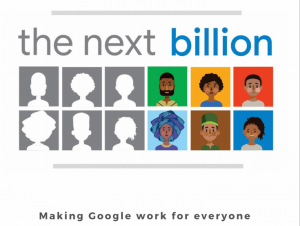- March 5, 2019
- Posted by: admin
- Categories: Digital Blog Posts, Digital Media News, Events

[Lagos] March 5, 2019: Google today hosted content creators, developers, media, influencers and educators at a product showcase in Lagos. Dubbed the NBU House, Google built the House to give users a chance to interact with the products it has developed specifically for the Next Billion Users (NBU) of the internet. Currently, only 36.1% of Africans have access to the internet, according to Internet World Stats.
Google’s Next Billion Users initiative is a company-wide drive to make its products and features more relevant to the emerging markets, taking into account the access challenges experienced by people in Africa.
Speaking at the event, Juliet Ehimuan-Chaizor, Google country director, Nigeria said that: “Google’s mission has always been to organise the world’s information and make it universally accessible and useful. Google’s NBU Initiative aims to further its mission of creating a more inclusive internet by creating products and features that are tailored to the needs of people in countries where they experience the internet on a mobile first and have data, network and hardware constraints. Today’s event serves to showcase the progress we have made so far.”
Featuring a combination of lightning talks and walk-through demos, visitors to the NBU House had a chance to learn about and experience the 8 NBU products Google has announced in Sub Saharan Africa to date – Google Go, Gmail Go, Android Go, Maps Go, YouTube Go, Datally, Files by Google and Google Station.
-
Google Go: Launched in Nigeria in April 2018, Google Go was designed specifically to provide a vastly improved and better way to browse the internet. It works perfectly on high-end smartphones as well as for the next billion users, who are coming online with low-end devices with poor connectivity. Google Go is available on Android to users in Kenya, South Africa, and Nigeria.
-
Gmail Go: With Gmail Go, users are able to access a light, fast and smart inbox that keeps their messages safe and organised, allows them to read email both online and offline, and includes 15GB of free storage.
-
AndroidTM 8.1 (Go Edition): Android Go, also referred to as Android Oreo (Go edition), is the slimmed down version of the Android Operating System released for entry-level phones. It provides data savings, great security, and high end performance on low end phones.
-
Maps Go: Google Maps Go is pre-installed on Android Oreo (Go edition) devices. The app is designed to run quickly and smoothly on devices with limited memory and allows users to search for and get information about places, get directions, and see what’s nearby their location.
-
YouTube Go: YouTube Go launched in Nigeria in September 2017, and is designed to tackle challenges faced by YouTube users in countries like Nigeria, such as data costs and connectivity. It enables users to preview videos before they watch them, choose what resolution videos to watch and share videos instantly without using data.
-
Datally: This is a smart and simple app that helps smartphone users understand, control, and save mobile data. Launched in November 2017, Datally enables users to track which apps use the most data, switch their data off at certain times (like bedtime) as well as blocking background app refresh and notifications which use data unnecessarily.
-
Files by Google: Launched in December 2017, Files by Google, formerly known as Files Go, is an app that helps smartphone users manage their files and storage space, find files faster and easily share them with others.
-
Google Station: Google Station is a platform that makes it easy for venues, system integrators, businesses and ISPs with access to fiber to set up, maintain and monetise their Wi-Fi networks. Google Station was launched first in Africa in Lagos in July 2018 followed by a second launch in Abuja in December 2018. Other countries will follow in the near future.
')}

